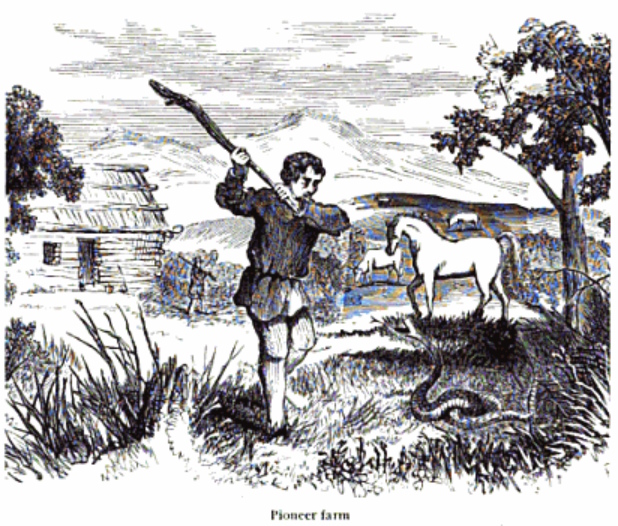Mr. Cornelius Van Horn has been named as one of the early pioneers.
He was still (1843) enjoying a quiet old age, on the farm, near Meadville,
earned and cleared by the toils and exposures of his youth. The following
story of his adventures was derived by the compiler of this work. in conver-
sation with a member of Mr. Van Horn’s family:
" Mr. Cornelius Van Horn had been a settler in Wyoming Valley under
the Pennsylvania title. and relinquished his possessions there under the com-
promise, receiving compensation from the State. In 1788 he was persuaded
by David Meade (who had also been a Pennamite) to make one of a party of
nine to come out and settle in Crawford County. They took the route from
Bald Eagle, in Centre County, over the Allegheny Mountains, nearly on the
route of the present turnpike, struck the mouth of French Creek, and thence
followed it up until they discovered the beautiful flat upon which Meadville
is now seated. They here selected their lands, and entered upon their labors.
Until l79l nothing of special importance occurred, except that one day, as
he was returning from Pittsburg with pack-horses, he was overtaken by an
Indian near a lonely swamp; but he proved to be friendly. His name was
McKee; and from this friendly interview and exchange of provisions, cour-
tesies, etc., commenced an acquaintance, which was afterwards probably the
means of saving Van Horn's life.
"In the month of May, 1791, Mr. Van Horn, Thomas Ray, and Mr.
Gregg were ploughing on the island opposite the town. Gregg and Ray had
gone in to fetch the dinner, when Van Horn, who continued ploughing, ob-
served his horses take fright, and turning suddenly he saw a tall Indian about
to strike him with his tomahawk, and another just behind. As quick as
thought he seized the descending arm, and grappled with the Indian, hugging
him after the manner of a hear. While in this close embrace, the other Indian
attempted to shoot Van Horn; but the latter, who was no novice in frontier
tactics, kept turning round the Indian in his arms so as to present him as a
shield against the bullet, and thus gained time enough to parley for his life.
No line-spun diplomacy was practiced in this treaty: a few words of broken
Indian on one side, and broken English on the other, resulted in a capitula-
tion, by which he was to be taken prisoner, together with his horses. He
was pinioned and taken to the top of the hill above the college, where they
met the old chief and a fourth Indian. After some parley, the chief mounted
one of the horses and the prisoner the other, and pursued their way towards
Conneaut Lake: while the three other Indians returned to the island for
further adventures. Gregg and Ray had just returned to their work, and
were deliberating over the meaning of the tracks in the field. when they
descried the three Indians. Gregg took to his heels, Ray calling to him to
stand his ground like a man; but he was pursued, killed, and scalped. Ray
was taken prisoner.
“The old chief had tied Van Horn by a thong to a tree, in a sitting
posture, with his arms behind him; but the thong working a little loose,
the chief pulled it obliquely up the tree to tighten it, and laid himself down
in the bushes to sleep. Van Horn, by raising himself, loosened the thong
enough to allow him to get a small knife out of his cuff.-he had previously.
to conciliate his good-will and allay suspicion. presented the chief with his
jack-knife, powder Horns, tobacco. etc..-and cut himself loose from the tree.

but could not unpinion his arms. lie made his way back to the settlement.
where he found an officer from Fort Franklin, who ordered the whole colony
to repair for safety to that place, lest there might be a larger force of Indians
in the vicinity than had yet appeared. Van Horn pleaded hard for permission
to remain, and learn the fate of Ray and Gregg; and as the officer’s horse
had been lost, he was allowed to remain if he could get another to remain
with him. A friendly Indian, by the name of Gilloway, agreed to remain;
and for some other reason it was thought necessary (this was to catch the
horse) that another friendly Indian. McKee, should remain also. They found
the horse. and. taking some bearskins, furs, etc.. in the canoe, embarked for
Franklin. Gilloway, as he was the least of the two, volunteered to ride the
horse, while the others went in the canoe; but he rode the horse a little too
far, and in the wrong direction, not being heard of again until he was seen
at Sandusky. Van Horn afterwards had reason to think that Gilloway had
remained behind to murder him, but that his plan had been frustrated by
the determination of McKee to stay also; and he then stole the horse.
“ Van Hom and McKee determined to return from Frankl
